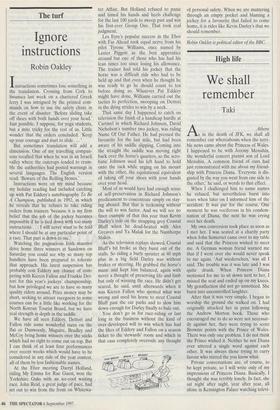The turf
Ignore instructions
Robin Oakley
Instructions sometimes lose something in the translation. Crossing from Cork to Swansea last week on a chartered Greek ferry I was intrigued by the printed com- mands on how to use the safety chute in the event of disaster: 'Before sliding take off shoes with both hands over your head.' Just possible, I suppose, for yoga students, but a mite tricky for the rest of us. Little wonder that the orders concluded: 'Keep up your courage and start to slide ... '
But sometimes translation will add a dimension. One of my travelling compan- ions recalled that when he was in an Israeli valley where the outcrops tended to crum- ble the authorities had posted warnings in several languages. The English version read: 'Beware of the Rolling Stones.'
Instructions were on my mind because my holiday reading had included catching up with Pat Eddery's autobiography To Be A Champion, published in 1992, in which he reveals that he refuses to take riding orders from trainers 'because it is my firm belief that the job of the jockey becomes impossible if he is tied down with too many instructions . . . I will never want to be told where I should be at any particular point of a race. That part is down to me.'
Watching the pugnacious Irish maestro drive home three winners at Sandown on Saturday you could see why so many top handlers have been prepared to tolerate that approach. His latest suspension has probably cost Eddery any chance of com- peting with Kieren Fallon and Frankie Det- tori for this year's jockeys' championship, but how privileged we are to have so many quality riders around. Prize money may be short, seeking to attract racegoers to some courses can be a little like working for the North Korean Tourist Board, but we have real strength in depth in the saddle.
We have all seen Eddery, Dettori and Fallon ride some wonderful races on the flat or Dunwoody, Maguire, Bradley and McCoy bring home winners over the sticks which had no right to come out on top. But I can think of at least four performances over recent weeks which would have to be considered in any ride of the year contest, all of them by less fashionable names.
At the Ebor meeting Darryl Holland, riding My Emma for Rae Guest, won the Yorkshire Oaks with an ice-cool waiting race. John Reid, a great judge of pace, had set out to win from the front on Whitewa- ter Affair. But Holland refused to panic and timed his hands and heels challenge for the last 100 yards to sweep past and win his first-ever Group One. That took real judgment.
Les Eyre's popular success in the Ebor with Far Ahead took equal nerve from his pilot Tyrone Williams, once named by Lester Piggott as the best apprentice around but one of those who has had his lean times too since losing his allowance. The trainer had told his jockey that the horse was a difficult ride who had to be held up and that even when he thought he was ready to go he should count to ten before doing so. Whatever Pat Eddery might have done, Williams carried out the tactics to perfection, swooping on Dettori in the dying strides to win by a neck.
That same day I happened to catch on television the finish of a handicap hurdle at Cartmel in which Richard Johnson, David Nicholson's number two jockey, was riding Name Of Our Father. He had pressed the favourite for the last mile, but had been aware of his saddle slipping. Coming into the straight the saddle was moving right back over the horse's quarters, so the acro- batic Johnson used his left hand to hold onto the tack while urging on his mount with the other, the equitational equivalent of taking off your shoes with your hands over your head.
Most of us would have had enough sense of self-preservation in Richard Johnson's predicament to concentrate simply on stay- ing aboard. But that is reckoning without the will to win factor. And we will see no finer example of that this year than Kevin Darley's ride on the strapping grey Coastal Bluff when he dead-heated with Alex Greaves and Ya Malak for the Nunthorpe Stakes.
As the television replays showed, Coastal Bluffs bit broke as they burst out of the stalls. So riding a burly sprinter at 40 mph plus in a big field Darley was without brakes or steering. He grabbed the horse's mane and kept him balanced, again with never a thought of preserving life and limb but only of winning the race. He didn't get scared, he said, until afterwards when it was Kieren Fallon who spotted what was wrong and used his horse to steer Coastal Bluff past the car parks and to slow him down enough for Darley finally to bale out.
You don't go in for race-riding or last long in the business without the kind of over-developed will to win which has had the likes of Eddery and Fallon on a season ticket to the stewards' room and which in that case completely overrode any thought of personal safety. When we are muttering through an empty pocket and blaming a jockey for a favourite that failed to come home, it is rides like Kevin Darley's that we should remember.
Robin Oakley is political editor of the BBC.


























































 Previous page
Previous page